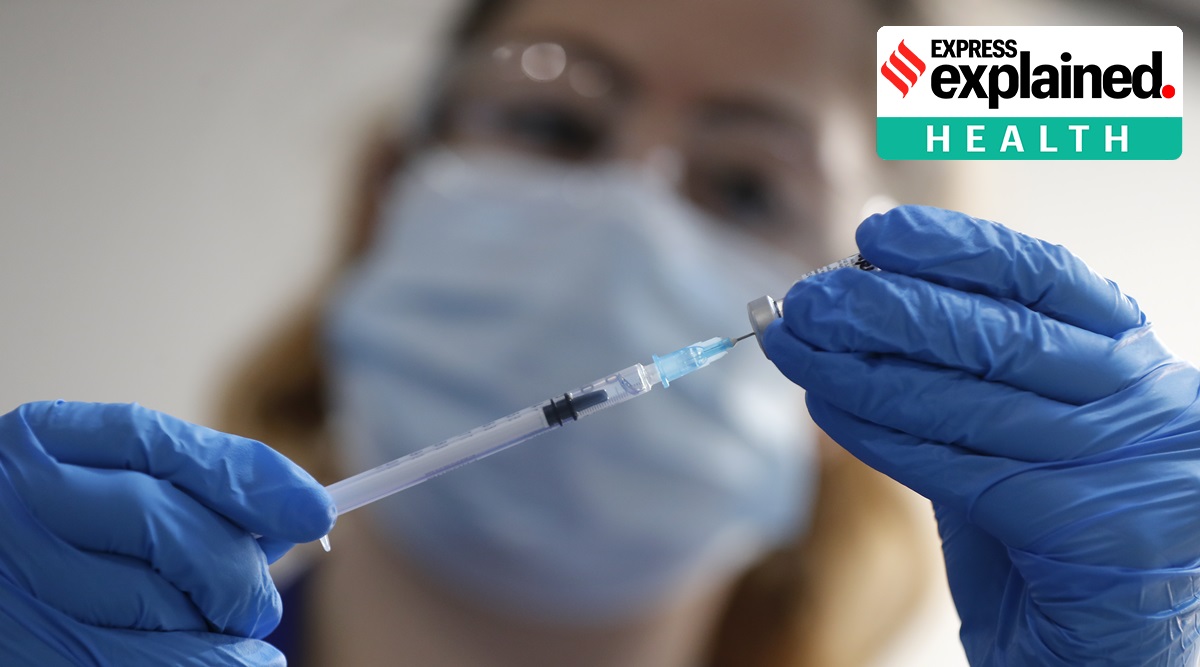
December 11, 2020 12:15:34 pm
 A nurse prepares an injection of the Pfizer-BioNTech Covid-19 vaccine at Guy’s Hospital in London, Tuesday, Dec. 8, 2020 (AP Photo: Frank Augstein)
A nurse prepares an injection of the Pfizer-BioNTech Covid-19 vaccine at Guy’s Hospital in London, Tuesday, Dec. 8, 2020 (AP Photo: Frank Augstein)
On Tuesday, the UK’s National Health Service (NHS) launched the largest immunization program in its history when it administered the first dose of the Pfizer / BioNTech Covid-19 vaccine to a 90-year-old woman.
On Wednesday, the Medicines and Healthcare Products Regulatory Agency (MHRA), the UK drug regulator, issued a warning against some of the possible allergic reactions to the vaccine.
The warning came after two vaccine recipients reported anaphylaxis (a type of allergic reaction that includes swelling, hives, low blood pressure, and, in severe cases, shock) and one recipient reported a possible allergic reaction to the vaccine. dose of the vaccine.
According to media reports, the two people who reported the allergic reaction have been treated and are now fine. According to the BBC, the two are understood to have a reaction called an anaphylactoid reaction, which involves skin rashes, shortness of breath, and sometimes a drop in blood pressure. This reaction is different from an anaphylaxis reaction, which can be fatal without immediate medical attention.
So what has the MHRA said?
The MHRA has said that anyone with a history of immediate-onset anaphylaxis to the vaccine, medication, or food should not receive the Pfizer / BioNTech vaccine. Also, those who experience anaphylaxis after the first dose should not get a second dose, the regulator has said.
The MHRA has also said that vaccine recipients should be monitored for 15 minutes after vaccination and that a protocol for the management of anaphylaxis and an anaphylaxis pack should always be available when the dose is administered. “It is very rare for someone to have a serious reaction to the vaccine (anaphylaxis). If this happens, it usually happens within minutes, ”the NHS said.
Other side effects from the vaccine are expected to be mild and generally should not last more than a week. These include pain in the arm where the needle was inserted, fatigue, headache, and an itchy sensation. These side effects can be controlled with pain relievers such as acetaminophen.
Are allergic reactions to vaccines common?
Post-immunization reactions are common, and according to WHO, vaccine reactions can be classified into two groups: mild and severe. A vaccine reaction is an individual’s response to the properties of the vaccine. Mild reactions including pain, swelling, redness at the injection site, fever, malaise, muscle pain, headache, or loss of appetite usually occur within a few hours of receiving the injection and resolve after a short period of time and represent “small dangers” said the WHO.
On the other hand, severe reactions do not lead to long-term problems, but they can be disabling and are “rarely” life-threatening.
According to the WHO, “anaphylaxis is a very rare allergic reaction (one in a million vaccinated), unexpected and can be fatal if not treated properly.” 📣 Follow Express explained on Telegram
Who is eligible to receive the COVID-19 vaccine in the UK?
Currently, the NHS offers the vaccine to people who are at the highest risk of developing serious illness from COVID-19. These groups of people include those who are 80 and older and already have a hospital appointment, people who work in nursing homes, and healthcare workers at high risk.
How is the vaccine administered?
The vaccine called BNT162b2 is intended for people 16 years of age and older and is given in two doses of 30 µg each, 21 days apart. The vaccine is injected into the person’s upper arm and takes a few weeks after the second dose is completed for it to work. “There is a small chance that you will still contract the coronavirus even if you have the vaccine,” the NHS has said.
Data from clinical trials suggest that the vaccine is more than 94 percent effective in adults over 65, meaning that in one trial, if 1,000 people are given the vaccine, about 60 are likely to become infected. despite the vaccine compared to those in the placebo group.
Still, people who are vaccinated will need to follow social distancing guidelines and wear masks, as scientists are still not sure whether vaccinated people can transmit the virus to other people or not.
© The Indian Express (P) Ltd
.